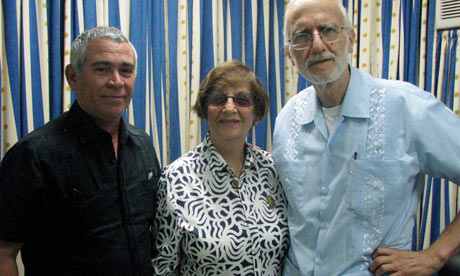
Cuba: Gross’ health is ‘normal and stable’
(Statement by the Director General for the United States at the Ministry of Foreign Relations of Cuba, Josefina Vidal Ferreiro. Translation by Progreso Weekly.)
*****
We have learned with concern about the press release issued in the morning of April 8 in Washington, which said that “Alan Gross, a USAID subcontractor imprisoned in Cuba for the past four years and four months, began a hunger strike last week.”
The Cuban government restates its willingness to find, together with the U.S. government, a solution to Mr. Gross’ case, acceptable to both parties, that contemplates the humanitarian concerns of Cuba related to the case of the three Cubans from the group called The Five who have been unjustly imprisoned in the United States for more than 15 years.
As is known, Mr. Gross has received a dignified and decorous treatment. Ever since his detention, he has been restricted to a hospital, not because his health condition requires it but because there he is guaranteed specialized attention by highly qualified medical personnel and health care givers.
Alan Gross is in good physical condition and his health is normal and stable. Under control are the chronic ailments typical of his age, for which he receives medical treatment. He has been visited by his wife and attorney, with whom he also maintains systematical telephone and electronic communication, as well as other relatives and friends. He has monthly consular access to U.S. diplomatic functionaries and receives visits from political and religious personalities.
Mr. Gross was detained, tried and punished for violating Cuban laws by implementing a subversive program financed by the Government of the United States, through the establishment of illegal and covert systems of communications with the use of noncommercial technology.
*****
(What follows is the story, as reported by The New York Times, of Gross’ decision to go on a hunger strike.)
Alan Gross announces hunger strike
By Michael D. Shear
WASHINGTON — Alan Gross, a former contractor for the United States Agency for International Development who has been imprisoned in Cuba for four years, plans to announce today (April 8) that he has begun a hunger strike to help him win his freedom, a spokesman for Mr. Gross said.
Mr. Gross, who was arrested by Cuban authorities in 2009 and accused of being an American spy, has denied working for any intelligence agency. He is calling on Cuba to release him and is demanding that President Obama get involved in his case.
“I am fasting to object to mistruths, deceptions, and inaction by both governments, not only regarding their shared responsibility for my arbitrary detention, but also because of the lack of any reasonable or valid effort to resolve this shameful ordeal,” Mr. Gross said in a statement released on Tuesday morning.
Scott Gilbert, Mr. Gross’s attorney, also criticized U.S.A.I.D. for recent reports that revealed that the agency tried to secretly create a Twitter-like communication system called ZunZuneo in Cuba even as Mr. Gross was incarcerated. Mr. Gilbert said the agency should have known that the effort could threaten Mr. Gross’s safety.
“Once Alan was arrested, it is shocking that U.S.A.I.D. would imperil his safety even further by running a covert operation in Cuba,” Mr. Gilbert said in the statement. “U.S.A.I.D. has made one absurdly bad decision after another. Running this program is contrary to everything we have been told by high-level representatives of the Obama administration about U.S.A.I.D.’s activities in Cuba.”
White House officials have said the ZunZuneo project, which was revealed last week by The Associated Press, was not a covert operation and was designed to help encourage democracy. Rajiv Shah, the director of U.S.A.I.D., is scheduled to testify on Capitol Hill on Tuesday and is expected to be questioned by lawmakers about the program.
Click to read the full New York Times story.
[Photo above is of Alan Gross (right) together with Jewish community leaders David Prinstein and Adela Dworin in a March 2012 meeting.]

